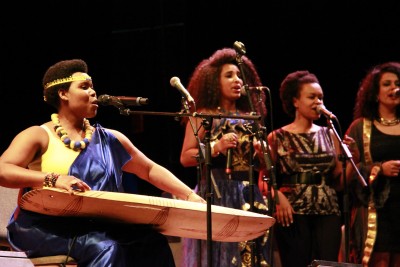
The spectacle of the flagship concert of The Nile Project, held Thursday after a week of panels and exhibitions, roared against a very serious concern for the issues it sought to expose.
“Somewhere around half a billion people live along the Nile today, and that’s projected to increase to almost a billion people living along the Nile in the coming few decades, so the human reliance on the Nile is huge,” said Nathan Phillips, a professor of earth and environment in Boston University’s College of Arts and Sciences. “This is occurring at a time where we have major concerns about shifting climate, water availability, the food-water-energy nexus, meaning the water is needed for people [and] it’s needed for the food the people eat.”
The Nile Project, co-founded in 2011 by Egyptian ethnomusicologist Mina Girgis and Ethiopian singer Meklit Hadero, is a musical collective with members from all 11 countries in the Nile River basin. The group aims to inspire exactly that cooperation, to educate and open dialogue about the Nile River conflict. Since Jan. 8, the group has been touring universities across the country, and was at Boston University this past week hosting workshops, a panel discussion and performances.
In the concert, musicians from Rwanda, Egypt, Ethiopia and other countries from the Nile River basin came together at the Tsai Performance Center in a display of unity, collaboration and friendship despite the ongoing disagreement among their home countries about the use of Nile River water. To Phillips, who also served as a panelist at the Nile Project’s closing discussion on Friday, overcoming that disagreement is not negotiable.
“I don’t know that there has been a good compromise in the past. It’s kind of just developed as it has,” he said. “I don’t know if any one country would want to horde all the water for itself anyway, but there’s the quantity of water and the quality of water, with the pollution and those kinds of things that are issues all along the river.”
The performance kicked off with a solitary Sophie Nzayisenga on the inanga, or “trough-zither.” Soon, she was joined by other musicians layering their vocals and instruments so that Nzayisenga’s solo swelled into a loud and joyful song that instantly got audience members clapping along. Other instruments on the stage included an assortment of traditional drums and tambourines, a kawala (an end-blown cane flute), a saxophone, a bass krar (a bowl-shaped string instrument) and the oud (a pear-shaped string instrument) among many others.
As the concert went on, different musicians took turns leading the band in original collaborations. Songs were sung in different languages, including Swahili, Arabic and English, with audience participation encouraged.
“Clapping won’t ruin the vibe,” said Sudanese vocalist Alsarah, “Clapping is the vibe!”
By the end of the show, it was less of a concert and more of a full interactive experience. The audience learned a three-part harmony in Swahili, and Kenyan percussionist Kasiva Mutua led a call-and-response drum/clapping solo. For the last song, the performers demanded the audience get out of their seats and learn a dance, though by this point people were so enthusiastic that little encouragement was needed. Everyone from young children to professors was in the aisle clapping, swaying and spinning in circles.
“It almost moved me to tears,” said Rebecca Demmellash, a junior in the College of Communication. “I’m really attached to my Ethiopian culture, so it resonated with me and my background a lot. I felt really connected to everything that was going on.”
“My favorite past was just seeing all of them together, all of them from different countries, but together collaborating on one song,” said Carissa Chamney, a BU grad student studying human physiology. “It stands for more than just playing music and singing songs.”
Unfortunately, the freshness of the performance underscores an issue that is by no means new. Disagreements between the Nile countries over how to best use the river’s water have been ongoing for decades. The most recent controversy over Ethiopia’s construction of the huge hydroelectric Grand Renaissance Dam had leaders in Egypt and other downstream countries concerned with the impact the dam would have on water flow.
“Really, it appears to be more about political control than it is about judicious use of water and storage of the water,” Phillips said. “There needs to be a whole lot more cooperation.”
For example, on March 23, leaders from Egypt, Sudan and Ethiopia signed an agreement that will open the way for further cooperation between the countries on Ethiopia’s dam project, a cause for much celebration on the Tsai stage on Thursday as Girgis announced the news of the agreement to the audience.
While policy changes and international cooperation are needed to make progress in the region, The Nile Project uses its music to promote change at a more grassroots level by connecting the people in the region.
“It’s a common language, a language that all people can understand, and it brings and bonds people together and creates that larger sense of community,” Phillips said. “The Nile musicians aren’t going to be going to the policy conference, necessarily, that are a result of this, but they are building the grassroots groundswell of people, the most important stakeholders in this whole thing.”
























































































































Ty Furman • Apr 3, 2015 at 8:44 am
Thanks for the great write up. Just a few quick clarifications. The musicians were from seven of the 11 countries bordering the Nile river. Dr. Phillips was on the Arts and Social Engagement Panel on Tuesday of that week. The Friday panel was on Water Politics and the Nile and the panelists can be found here – http://www.bu.edu/arts/nile-project.